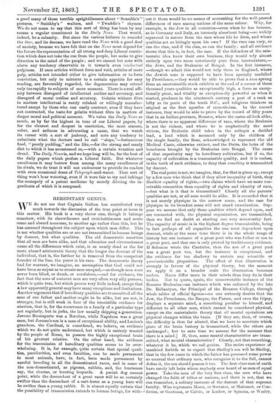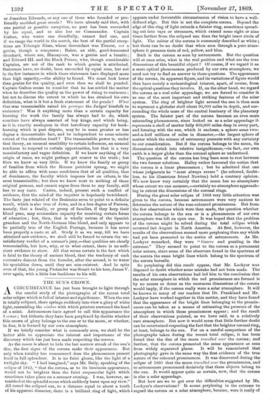HEREDITARY GENIUS.
WE do not see that Captain Galton has contributed very much towards the discussion of the true point at issue in this matter. His book is a very clever one, though it belongs somehow, with its shmwdnesses and crotchettinesses and acute sense and absurd nonsense, to another age rather than this, but he has assumed throughout the subject upon which men differ. This is not whether qualities are or are not transmitted in human beings by descent, but what qualities. The old democratic assertion that all men are born alike, and that education and circumstances cause all the differences which exist, is as nearly dead as the far more absurd aristocratic theory that the longer the descent of the individual, that is, the further he is removed from the competent founder of the line, the purer is his race. The democratic theory had for warrant, we imagine, an assumption that God could not have been so unjust as to create men unequal,—as though men were never born blind, or dumb, or scrofulous,—and for evidence, the fact that the sons of eminent men are very often very silly persons, which is quite true, but which proves very little indeed, except that law apparentlygeneral may have many exceptions and limitations. Another argument that if hereditary qualities are transmitted all the sons of one father and mother ought to be alike, but are not, is stronger, but is still weak in face of the irresistible evidence for atavism, that is, for the recurrence in a family of a particular type not regularly, but in jerks, the law usually skipping a generation. Jerome Buonaparte was a Boeotian, while Napoleon was a great man, but Jerome's son is a man of exceptional ability, and Lucien's grandson, the Cardinal, is considered, we believe, on evidence which we do not quite understand, but which is entirely trusted by the people of Rome, to possess the highly exceptional brain of his greatest relative. On the other hand, the evidence for the transmission of hereditary qualities seems to be over- whelming. It is, for example, quite certain that special quali- ties, peculiarities, and even faculties, can be made permanent in most animals, have, in fact, been made permanent by careful breeding in all the domesticated races, and in some of the non-domesticated, as pigeons, rabbits, and, the huntemen say, the cheetas, or hunting leopards. A pariah dog cannot point, while the descendant of a great racer will be as certainly swifter than the descendant of a cart-horse as a young hare will be swifter than a young rabbit. It is almost equally certain that the possibility of transmission extends to human beings, for with- out it there would be no means of accounting for the well-proved differences of race among nations of the same colour. Why, for example, is the Jew in all countries—even when he has become, as in Germany and Italy, an intensely absorbent being—so widely separated in nature from the race whose life he lives, and whose qualities act so bitingly upon his own ? If the race can vary, so can the clan, and if the clan, so can the family ; and all evidence shows that this is, in fact, the case. If the defenders of the aris- tocratic idea kuew their own business, they would rely almost entirely upon two races notoriously pure from intermixture,— the Jews, and the Brahmins of Bengal. In the first instance, —though we admit this would not help them in England, where the Jewish nose is supposed to have been specially modelled by Providence,—they would be able to prove that a race sprung from an ascertainable stock exhibits at the end of a career of three thousand years qualities as exceptionally high, a force as excep- tionally great, and vitality as exceptionally powerful as when it started, produces in the nineteenth century a poet of a rank as lofty as its poets of the tenth B.C., and religious thinkers as original as the first apostles of monotheism. In the second instance, they would be able to prove by the record of fifty years that in an Indian province, Benares, where the castes all look alike, where there is no apparent difference of race, where the Brahmin is not the richest, and where he is emphatically the most vicious, the Brahmin child takes in the colleges a decided lead, a lead which is menaced only by the children of the single family, the Sens, acknowledged to represent the old Medical Caste, otherwise extinct, and the Dutts, the heirs of the henchmen brought by the Brahmins into Bengal. The cause of that superiority may be hereditary cultivation, but if so, the capacity of cultivation is a transmissible quality, and it is useless, in the teeth of such evidence, to deny that something is transmitted by descent.
The real point is not, we imagine, that, for that is given up, except by a few men who think that if they allow inequality of birth, they disallow equality of rights,—two claims which have no more con- ceivable connection than equality of rights and identity of race, —but what is it that is transmitted? Clearly all the parents' qualities are not, or all sons would be alike. It is conceded that it is not merely physique in the narrow sense, and the ease for physique in its broadest sense will not stand examination. Sup- pose we assume that only those qualities which depend upon, and are connected with, the physical organization, are transmitted, then we find no doubt at starting one very noteworthy fact. The capacity of music is in the highest degree transmissible, being in fact perhaps of all capacities the one most dependent upon descent, while at the same time there is in the whole range of history but one instance of a great poet who was father or son to a great poet, and that one is only proved by traditionary evidenoe. If Solomon wrote the Canticles, then the son of a great poet was a great poet too, but the instance is exceptional, and the evidence far too shadowy to sustain any scientific or
quasi-scientific proposition. The effect of that illustration is strongly in favour of the physical theory, but the moment we apply it on a broader scale the illustration becomes useless. Races differ more in their minds than they do in their bodies. Not to quote, again, the unanswerable instance of the Benares Brahmins—an instance which was enforced by the late Dr. Ballantyne, the Principal of the Benares College, through whole tables of official figures—no one seriously doubts that the Jew, the Frenchman, the Basque, the Parsee, and even the Gipsy, displays a separate mind, a something peculiar to himself, and different to all other men, which cannot be considered physical, except on the materialistic theory that all mental operations are physical changes within the brain. [If they are, then, of course, the difficulty is thus far altered, that we have to ascertain which plate of the brain battery is transmitted, while the others are unchanged ; but to nave time we assume for the moment that there is a mind.] If, then, some mental characteristics are trans- mitted, what mental characteristics ? Clearly, not that something, whatever it be, which we call genius. The entire experience of mankind forbids us to expect that Shelley's son will be Shelley, that in the few cases in which the father has possessed some power so unusual that ordinary men, who recognize it to the full, cannot define it, the eon should possess it too. The first-class men of earth have rarely left heirs whom anybody ever heard of as men of equal power. Take the men of the very first class, the men who have changed the faith of tribes or nations, and there is not, that we can remember, a solitary instance of the descent of that supreme faculty. Who represents Moses, or Socrates, or Mehemet, or Con- fucius, or Gautama, or Calvin, or Luther, or Spinoza, or Wesley,
or Jonathan Edwards, or any one of those who founded or pro- foundly modified great creeds ? We have already said that, with one partial or possible exception, no poet has been succeeded by his equal, and so also has no Commander. Captain Galton, who wants one dreadfully, cannot find one, and if we range the world in the search, the best of the partial excep- tions are Tchengis Khan, whose descendant was Timour, not a genius, though a conqueror ; Baber, an able, good-humoured drunkard, whose son, Humayoon, was a genius and a lunatic ; and Edward III, and the Black Prince, who, though considerable Captains, are not of the rank to which genius is attributed. Statesmen have, no doubt, been succeeded by equal sons, but not in the few instances in which those statesmen have displayed more than high capacity,—the ability to found. We must look lower than genius for the quality, and even then we shall be puzzled. Captain Gallen seems to consider that he has settled the matter when he describes the quality as the power of rising to eminence ; but not to discuss the extent to which he has strained his own definition, what is it but a fresh statement of the puzzle ? What that twee transmissible raised his proteges the Judges' kinsfolk to eminence ? Was it anything more than a certain capacity for learning the work the family has always had to do, which courtiers have always asserted of boy kings, and which being, as it is, exactly analogous to that hereditary capacity for book- learning which is past dispute, may be in some greater or less degree a demonstrable fact, and be independent to some minute extent of the education itself ? The transmissible power is, under that theory, an unusual sensibility to certain influences, an unusual readiness to respond to certain opportunities, but that is a very unsatisfactory and vague definition, If we knew anything of the origin of races, we might perhaps get nearer to the truth ; but then we know so very little. If we knew the family or group of families from which the Roman patriciat sprang, we might be able to affirm with some confidence that of all qualities, that of dominance, the faculty which imposes law on others, is the most transmissible ; but then we know next to nothing of those original persons, and cannot argue from them to any family, still less to any caste. Castes, indeed, present such a conflict of evidence, that the mind of the inquirer is hopelessly bewildered. The facts just related of the Brahmins seem to point to a definite result, which is also true of Jews, and in a less degree of Parsees, namely, that a family, or group of families, if they keep their blood pure, may accumulate capacity for receiving certain forms of education ; but, then, that is wholly untrue of the Spanish grandees and the North-German blue blood, and only appears to be partially true of the English Peerage, because it has never been properly a caste at all. Study it as we may, till we have obtained new evidence, we shall still be forced to return the un- satisfactory verdict of a coroner's jury,—that qualities are clearly transmissible, but how, why, or to what extent, there is no suffi- cient evidence to show. All that seems certain is the fact which is fatal to the theory of ancient blood, that the tendency of each successive descent from the founder, after the second, is to water his specialties down, until they are non-existent. And in spite even of that, the young Pretender was Stuart to his toes, James V. over again, with a little less backbone to his will.



































 Previous page
Previous page